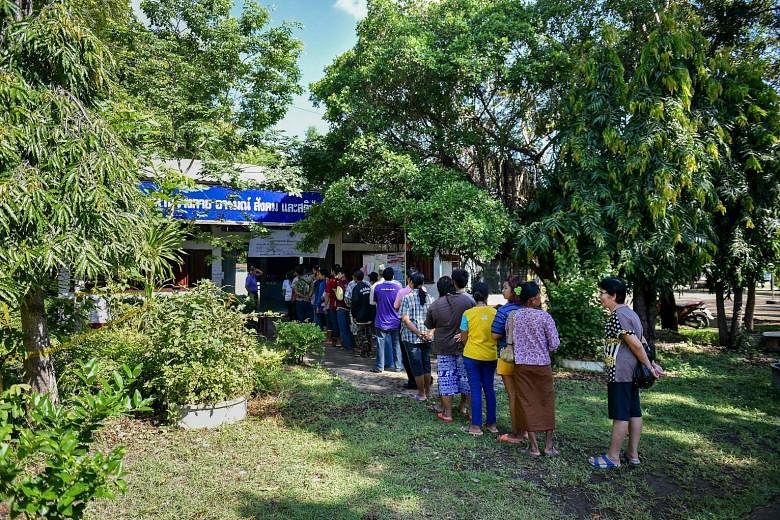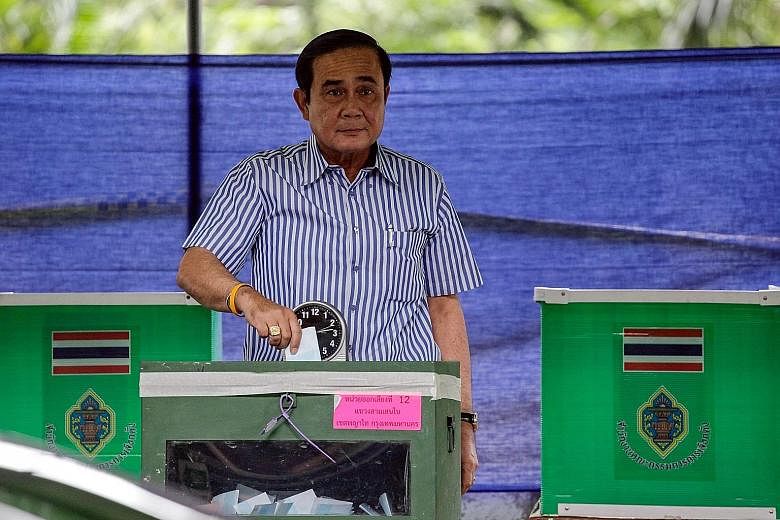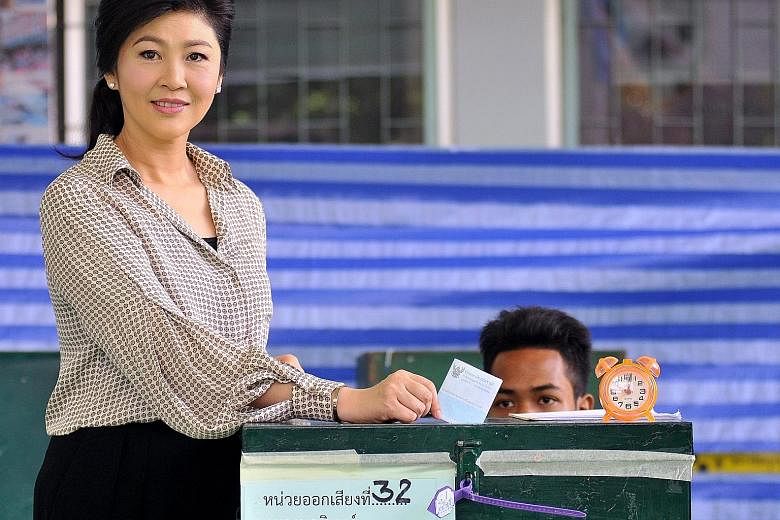Voting was brisk, orderly and quiet.
In contrast to the rowdy scenes two years ago when protesters sabotaged an election that the incumbent Puea Thai party was poised to win, voting in yesterday's nationwide constitutional referendum was relaxed and almost low-key.
Privy Council member Surayud Chulanont, a former army commander who was made an interim prime minister after the 2006 coup that ousted then prime minister Thaksin Shinawatra, turned up at his lightly-policed Bangkok polling station wearing shades and a bright blue shirt.
Another former prime minister, Ms Yingluck Shinawatra, Thaksin's younger sister, cast her ballot then headed to a temple in eastern Bangkok to release birds and fishes in a traditional Thai ceremony.
A roadside bomb targeting a convoy carrying ballot boxes killed one person. An anti-coup activist was arrested after he tore up his ballot paper. Otherwise, most Thais in this deeply divided country simply let their vote do the talking.
-
What does a "yes" vote mean?
-
•The draft charter becomes the 20th Constitution, replacing the one scrapped after the coup.
•It paves the way for an election next year.
•The junta will select almost all of the 250 senators. Six seats in the Upper House will be reserved for senior military and security officials.
•The prime minister need not be an elected official.
•The electoral system will make it hard for any single party to win enough seats to dominate the government.
•The future government will be closely scrutinised by a Senate largely picked by the ruling junta during the transitory five-year period.
•The future elected government has to abide by a "national strategy plan", failing which it risks impeachment.•••••••
Tan Hui Yee
The referendum took place some two years after the military seized power from a Puea Thai party government paralysed by street protests and judicial rulings. Since the coup in May 2014, Asean's second-largest economy has been run by a military government under an interim Constitution that grants the junta absolute power.
Coup-maker and Prime Minister Prayut Chan-o-cha had promised to hold an election next year if the draft Constitution, which will be Thailand's 20th if enacted, passes muster at the plebiscite.
But the terms are unpalatable to human rights advocates, who warn that the draft charter would allow the military to control a future elected government without even staging a coup.
Those who support the draft Constitution, however, said they were fed up with the politicians that Thailand has seen in its 84-year-old democratic history and welcomed military oversight.
Retired civil servant Chirakom Kitiyakara, 69, told The Straits Times: "I would love to get rid of the crooked politicians… They just come to cheat and enrich themselves, without doing anything for this country."
Opponents of the draft charter were much more hesitant to speak out, given the authorities' record of prosecuting "vote no" activists in the lead-up to the referendum.
Said Mr Chlo Samanya, 52: "I want people to be able to elect our parliamentarians, not have the government give us a pack of people and tell us they are our representatives."
The freelance documents agent was resigned to the possibility of the situation turning against his wishes, given deeply divided sentiments in the coup-prone country. In the 2007 post-coup referendum, 57 per cent of all votes cast were in favour of a draft charter that increases the role of appointed parliamentarians.
"I am not going to wait for the results tonight," he said. He appeared to have good reason for his fears, as unofficial results showed that the majority of the votes cast were in favour of the charter.
There were some worries about disruption just before the referendum began. Several bombs were detonated overnight in the southern border provinces where militants are waging a separatist insurgency. A roadside bomb targeting a convoy carrying ballot boxes in Pattani province killed one school official and injured two policemen, according broadcaster Thai PBS.
Pokemon Go, the popular new location-based smartphone game, was launched on Saturday, triggering a warning from the election commission to gamers not to wander into polling stations in the hope of nabbing a virtual monster.
In the end, the biggest distractions came from a late afternoon downpour in Bangkok that sent officials scurrying, as well as the media scrums that broke out as high- profile voters cast their ballot.
At Bangkok's Klong Lum Jiak School, where Ms Yingluck appeared, the pandemonium died down as soon as she left.
A polling official began removing the tape that had been used to separate the media from the voting area.
"Peaceful at last," he muttered to himself.



